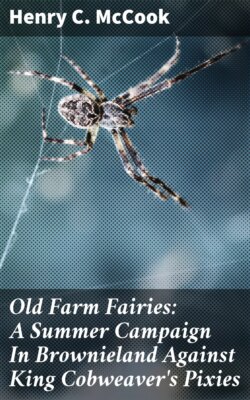Читать книгу Old Farm Fairies: A Summer Campaign In Brownieland Against King Cobweaver's Pixies - Henry C. McCook - Страница 6
На сайте Литреса книга снята с продажи.
Оглавление[Pg xxxiii] Fig. 10.—Our Farm Family in Literary Council.
"Needer I have, Sah!" the old man replied, rolling up the whites of his eyes and shaking his shaggy, gray poll. "Needer I have! an' wat's moah, I ain't gwine ter. I doan see much good in dem kine ob books no how—specially de picters. Dar's like to be bad work aboout dem tings. Hit doan do ter be too fumwiliar wid such tings. W'at's de good? Dar's no tellin' w'at dey mought do ter we'ns, ef dey gits sot agin us. You bes' keep clar ob dat business, Mars Mayfiel'. De ole Bible's good 'nough fer me, Sah; an' hit says dat much larnin' makes a man mad, an' books is a-wearisome to de flesh. An' dat's a fac', Sah—leastways, readin' an' a-studyin' on 'em is. You kin do w'at you's a mine ter, an' I 'low you'll prent de Brownie book, any way. Hit's mighty good hearin', I'll say dat fer it, but—" he shook his head once more, and was silent.
The next day I wrote to the Schoolmistress as follows:
The Old Farm.
My dear Miss Abby:
I have gone over the manuscript that you sent, and on the whole I approve of it, and agree to print it with such editorial notes as Queen Fancy has suggested. We have also—the Mistress and I—read it to the Farm family, having revived our last winter's "Say-an-says" for that purpose. I have even translated bits of the story into simpler form and speech for the youngest member of our household, four-year-old Dorothy. Our young people are enthusiastic in their admiration, and vote to print the book. So do the others, with the exception of Dan, who is noncommittal. But the old fellow enjoyed the reading as much as the rest. He thinks the story a true one, and declares that he has seen the Brownies! You know his boundless superstition, and his odd habits of personifying all living things and talking aloud to them as he goes about his work. I have no doubt that he has peopled his little world with many queer imaginary creatures who may well stand to his undisciplined fancy for Fairies and Goblins, Brownies and Pixies. He has unwavering faith, also, in the occult influence of such beings and of insects generally upon the destinies of human kind.
By the way, this unexpected deliverance of Dan's has eased my mind as to one feature of the story, viz: the manner in which the life and behavior of the Willes are interwoven with, and interdependent upon, the movements of the Brownies and Pixies. Since I have thought more about it, I have greatly abated the fear that the verisimilitude of such relations might not sufficiently appear to readers.
In point of fact, the creatures of the Insect World, as personified in the story, have had and shall have much to do with determining the lot of man. The plagues of Egypt as written in the Book of Exodus, furnish an example; as also the incursions of cankerworm, locust, caterpillar and palmerworm recorded elsewhere in Scripture. African travelers tell us that the tetze fly has so circumscribed the geographical bounds within which certain domestic animals can live, as to greatly limit or modify civilization. We all know examples of the effects of mosquito supremacy at certain points of our country in determining the fortunes of men or places. The familiar stories of Bruce and the Spider, and Mahomet and the Spider, are also in point as showing how great interests may hinge upon the behavior of an humble animal. Here are facts enough, surely, to justify us in facing the public with Governor Wille and his relations to the imaginary folk of the story.
In conclusion, I must say that I have been greatly interested to note how admirably the habits of my spider friends admit of personification. The so-called engineering, ballooning, cavemaking, sailing, and other operations, are so accurately described by those words, that the manlike qualities, motives and passions attributed to the actors seem almost natural. At one moment I find myself accepting the representations as a matter of course, and anticipating the conduct described on the very ground of known natural habits. At another time I am startled at the strong tone of human behavior that the descriptions so easily admit. Certainly, this is something more than what the naturalists have called "anthropomorphism." What is the mysterious ligature that binds in this sympathy of movements the sovereign will of immortal man and the automatic brain cell of a spider?
Pardon me! it was not in my purpose to start so profound a question of philosophy and physiology. I only meant to say that the wishes of yourself and your Brownie acquaintances shall be cheerfully granted, and the manuscript be given to the public.
I am, very truly,
Your Friend,
Fielding Mayfield.
